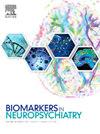紧张症患者的主观体验、社会心理功能和不同的精神运动集群:它们之间有何联系?
Q2 Medicine
引用次数: 0
摘要
背景紧张症涉及精神运动活动的减少、增加和异常,但以往的研究大多集中在运动体征上,忽视了患者的主观体验。本研究旨在描述ICD-11中引入的精神运动活动水平及其与紧张症主体性和整体社会心理功能的关系。方法采用精神运动相关临床评定量表和Northoff紧张症主观体验量表(NSSC),根据ICD-11对54例紧张症患者和90例精神分裂症谱系或情绪障碍患者进行了检查。对于紧张症患者,计算ICD-11精神运动类及其替代参数的部分相关系数。使用MANCOVA和事后方差分析分析组间差异。最后,采用线性判别分析(LDA)对icd -11相关精神运动活动的各评定量表和不同替代参数的分类价值进行检验。结果紧张症患者精神运动活动减少与精神运动发育迟滞相关(p < 0.05),精神运动活动增加与冲动性呈正相关,与精神运动发育迟滞负相关(p < 0.01)。异常的精神运动活动与刻板印象、举止、矫揉造作和姿态呈正相关。在主观体验、社会表现、特质焦虑、精神运动迟缓、加工速度和认知功能方面,组间存在显著差异。LDA显示,各自的精神运动相关评定量表能够区分诊断组,尽管分类准确率不同(61.8 %-87.5 %)。结论:根据ICD-11的定义,我们确定了紧张症患者不同程度的精神运动活动、主观体验和社会心理功能之间的关系。未来需要大规模的研究来验证这些发现,并通过将主观经验与客观评定量表相结合来完善评估工具,如NSSC。这种方法可以为更有针对性的治疗选择铺平道路,考虑到紧张症患者独特的主观体验。本文章由计算机程序翻译,如有差异,请以英文原文为准。
Subjective experience, psychosocial functioning and different psychomotor clusters in catatonia: How are they connected?
Background
Catatonia involves decreased, increased, and abnormal psychomotor activity, but most previous studies mainly focused on motor signs, neglecting the patients' subjective experiences. This study aimed to characterize psychomotor activity levels as introduced in the ICD-11 and their relation to subjectivity and overall psychosocial functioning in catatonia.
Methods
We examined 54 patients with catatonia and 90 patients with schizophrenia spectrum- or mood disorders according to ICD-11 using an extensive battery of psychomotor-related clinical rating scales and Northoff Scale for subjective experience in catatonia (NSSC). For catatonia patients partial correlation coefficients between ICD-11 psychomotor clusters and their surrogate parameters were calculated. Group differences were analyzed using MANCOVA and post-hoc ANOVA. Finally, linear discriminant analysis (LDA) was used to examine the classification value of the respective rating scales and different surrogate parameters of ICD-11-related psychomotor activity.
Results
In catatonia patients decreased psychomotor activity was associated with psychomotor retardation (p<.05)), while increased activity was positively correlated with impulsivity and negatively correlated with psychomotor retardation (both p-values<.01). Abnormal psychomotor activity was positively associated with stereotypies as well as mannerisms, affectation and posturing. Significant group differences were observed in subjective experience, social performance, trait anxiety, psychomotor slowing, processing speed, and cognitive functioning. LDA revealed that the respective psychomotor-related rating scales are capable of distinguishing between diagnostic groups, albeit with varying degrees of classification accuracy (61.8 %-87.5 %).
Conclusion
We identified a relationship between varying levels of psychomotor activity, subjective experiences, and psychosocial functioning in catatonia as defined by the ICD-11. Future large-scale studies are needed to validate these findings and refine assessment tools, such as the NSSC, by integrating subjective experiences with objective rating scales. This approach could pave the way for more tailored treatment options that consider the unique subjective experiences of catatonia patients.
求助全文
通过发布文献求助,成功后即可免费获取论文全文。
去求助
来源期刊

Biomarkers in Neuropsychiatry
Medicine-Psychiatry and Mental Health
CiteScore
4.00
自引率
0.00%
发文量
12
审稿时长
7 weeks
 求助内容:
求助内容: 应助结果提醒方式:
应助结果提醒方式:


